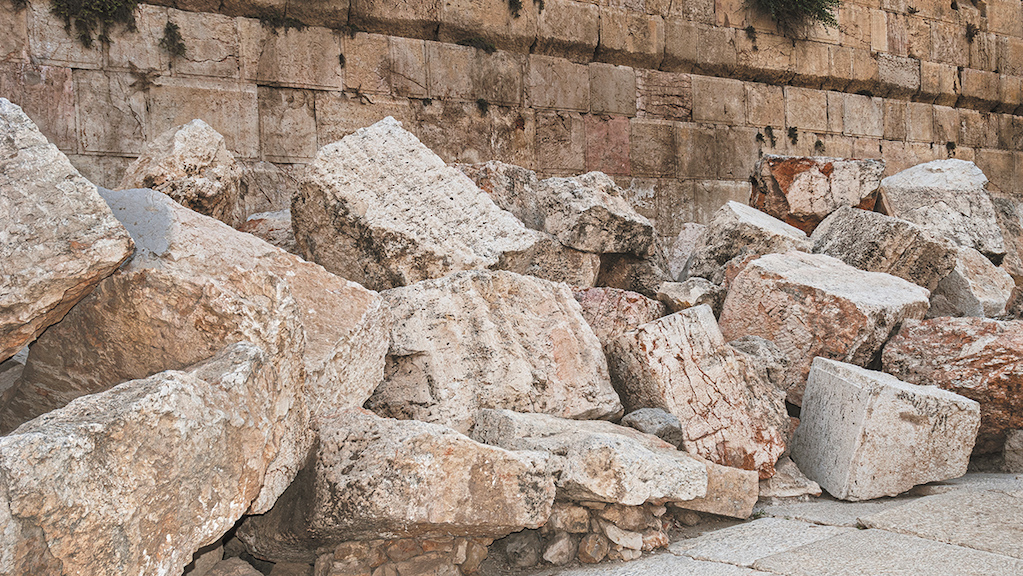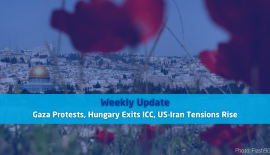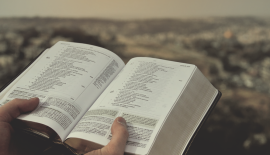Middle East at War? Jerusalem, the Burdensome Stone
We have been exploring the topic of today’s Middle East war and how it compares with end-time prophecy. One of the prophetic signs Jesus predicted in the days before His second coming was “wars and rumours of wars” (Matthew 24:6). Tragic as it may be, on the positive side, it is part of the birth pangs of the coming kingdom.
One of the key prophets regarding the last days and Armageddon is Zechariah. He gives impressive prophecies on both the first and second coming of Christ. In this article, we want to focus on Zechariah 12:
“Behold, I will make Jerusalem a cup of trembling unto all the people round about, when they shall be in the siege both against Judah and against Jerusalem. And in that day will I make Jerusalem a burdensome stone for all people: all that burden themselves with it shall be cut in pieces, though all the people of the earth be gathered together against it.” Zechariah 12:2-3
When Zechariah prophesied these words twenty-five hundred years ago, Jerusalem was a humble walled village at the fringe of the Persian Empire.
In 1867, Mark Twain, the American novelist, visited Ottoman Palestine. His visit inspired the runaway bestselling travel book Innocents Abroad. His description of Jerusalem was anything but flattering:
“Renowned Jerusalem itself, the stateliest name in history, has lost all its ancient grandeur, and is become a pauper village; the riches of Solomon are no longer there to compel the admiration of visiting Oriental queens; the wonderful temple which was the pride and the glory of Israel, is gone …”(1).
If you told Twain that one day in the future, this ‘pauper village’ would modernise, grow and become the epicentre of international controversy and conflict, he would have laughed you out of the room! Yet, this is precisely what the prophetic word declared: “Jerusalem will increase in stature and size and become a global obsession.”
“Cup of Trembling: Zechariah 12:2”
Here is God’s declaration regarding the nations and Jerusalem. He will make the Holy City a ‘cup of trembling.’ The Hebrew word for ‘trembling’ is ra’al, which means to ‘shake, reel, quiver, and/or tremble.’ This is more than mere intoxication. It is as if those who drink from the cup will become senseless, lose control, and become dangerously unhinged.
Who is going to drink from this poisonous cup? The text says, “all the people round about.” This could mean the immediate Arab neighbours of Israel (Psalm 83). Then there is the Gog and Magog invasion of Ezekiel 38-39. To answer the question of who is drinking from this cup, remember they will be besieging Judah and Jerusalem when the cup is offered. So, in theory, the invaders could be near or far, neighbours or regional nations. They will wage a massive invasion and get stunned with senselessness.
“The Burdensome Stone: Zechariah 12:3”
At the Western Wall Tunnel in Jerusalem there is an amazing sight: a larger-than-life single-cut stone called the ‘Western stone.’ It is 13.6 metres (45 feet) in length, 3 metres (10 feet) in height, and approximately 3.5 metres (11 feet) in width. The estimated weight is 570 short tons! How would you lift such a stone into its place? We would be scratching our heads today, let alone two millennia ago in the days of Herod the King. (2).
Jerusalem is like that large, immovable stone. Now we come to the heart of the whole matter; God declares that “in that day”—the day that the nations besiege Judah and Jerusalem—He will make Jerusalem an even ma’amasah, meaning a heavy, un-moveable, and burdensome stone. Humanly speaking, it is an unsolvable problem. Not only will the stone not budge, but those who try to make it do so will be injured. In this verse, it says that those who burden themselves with this stone “shall be cut into pieces.” This is despite the fact that “all the people of the earth be gathered together against it.” The nations are coming to Jerusalem—first for war (12:3), then for peace (14:16).
“The nations are coming to Jerusalem—first for war (12:3), then for peace (14:16)”
This is an incredible picture. As we learned earlier, there is nothing about Jerusalem that should make it the object of global attention and armed conflict, at least in the natural. It is neither large, strategic, nor well endowed with natural resources. It does not make sense (and a sip from the cup of trembling will lead to madness).
Jerusalem has key powerful stakeholders beyond just the Israelis and Palestinians, including the US, UN, EU, the Vatican, the Arab and Muslim world, Russia, and others. It is the subject of no less than sixty United Nations resolutions. It is a hot topic in any Middle East peace conference. It continues to evoke emotions and strong rhetoric on all sides. The push for a two-state solution between Israel and Palestine has embedded in it a two-Jerusalem solution as well. Will the holy city be partitioned again, like it was from 1948 to 1967? The world community is demanding this outcome more than ever. If they don’t get what they want by peaceful means, will armed conflict be next? Watch and pray (Mark 13:33, 35, 37).
“When the Lord shall build up Zion, He shall appear in His glory.” Psalm 102:16.
The growth and modernisation of Jerusalem, plus the international controversy and conflict over its ownership, were prophesied long ago. They are a milepost along the road telling us that the footsteps of Messiah are at the door.
Parts of this article are drawn from the book The Burdensome Stone: Jerusalem in the Last Days by K. Majdali, Melbourne: Teach All Nations, 2019.
(1) Mark Twain (Samuel Clemens), Innocents Abroad, Project Gutenberg eBook 2006, (first published 1869).
(2) https://en.wikipedia.org/wiki/Western_Wall_Tunnel





